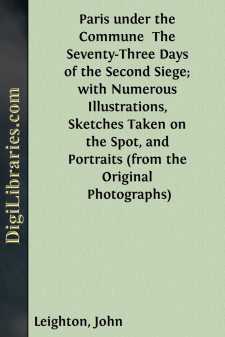Categories
- Antiques & Collectibles 13
- Architecture 36
- Art 48
- Bibles 22
- Biography & Autobiography 813
- Body, Mind & Spirit 142
- Business & Economics 28
- Children's Books 16
- Children's Fiction 13
- Computers 4
- Cooking 94
- Crafts & Hobbies 4
- Drama 346
- Education 46
- Family & Relationships 57
- Fiction 11829
- Games 19
- Gardening 17
- Health & Fitness 34
- History 1377
- House & Home 1
- Humor 147
- Juvenile Fiction 1873
- Juvenile Nonfiction 202
- Language Arts & Disciplines 88
- Law 16
- Literary Collections 686
- Literary Criticism 179
- Mathematics 13
- Medical 41
- Music 40
- Nature 179
- Non-Classifiable 1768
- Performing Arts 7
- Periodicals 1453
- Philosophy 64
- Photography 2
- Poetry 896
- Political Science 203
- Psychology 42
- Reference 154
- Religion 513
- Science 126
- Self-Help 84
- Social Science 81
- Sports & Recreation 34
- Study Aids 3
- Technology & Engineering 59
- Transportation 23
- Travel 463
- True Crime 29
Paris under the Commune The Seventy-Three Days of the Second Siege; with Numerous Illustrations, Sketches Taken on the Spot, and Portraits (from the Original Photographs)
by: John Leighton
Description:
Excerpt
INTRODUCTORY.
Late in the day of the 30th October, 1870, the agitation was great in Paris; the news had spread that the village of Le Bourget had been retaken by the Prussians. The military report had done what it could to render the pill less bitter by saying that "this village did not form a part of the system of defence," but the people though kept in ignorance perceived instinctively that there must be weakness on the part of the chiefs. After so much French blood had been shed in taking the place, men of brave will would not have been wanting to occupy it. We admit that Le Bourget may not have been important from a military point of view, but as regarding its moral effect its loss was much to be regretted.
The irritation felt by the population of Paris was changed into exasperation, when on the following day the news of the reduction of Metz appeared in the Official Journal:
"The Government has just been acquainted with the sad intelligence of the capitulation of Metz. Marshal Bazaine and his army were compelled to surrender, after heroic efforts, which the want of food and ammunition alone rendered it impossible to maintain. They have been made prisoners of war."
And after this the Government talks of an armistice! What! Strasburg, Toul, Metz, and so many other towns have resisted to the last dire extremity, and Paris, who expects succour from the provinces, is to capitulate, while a single effort is left untried? Has she no more bread? No more powder? Have her citizens no more blood in their veins? No, no! No armistice!
In the morning, a deputation, formed of officers of the National Guards, went to the Hôtel de Ville to learn from the Government what were its intentions. They were received by M. Etienne Arago, who promised them that the decision should be made known to them about two o'clock.
The rappel was beaten at the time mentioned; battalions of the National
Guards poured into the Place, some armed, many without arms.
Over the sea of heads the eye was attracted by banners, and enormous placards bearing the inscriptions—
"Vive la République!
"No Armistice!"
or else
"Vive la Commune!
"Death to Cowards!"
Rochefort,[1] with several other members of the Government, shows himself at the principal gate, which is guarded by a company of Mobiles. General Trochu appears in undress; he is received with cries of "Vive la République! La levée en masse! No Armistice! The National Guards, who demand the levée en masse, would but cause a slaughter. We must have cannon first; we will have them." Alas! it had been far better to have had none whatever, as what follows will prove. While some cry, "Vive Trochu!" others shout, "Down with Trochu!" Before long the Hôtel de Ville is invaded; the courts, the saloons, the galleries, all are filled. Each one offers his advice, but certain groups insist positively on the resignation of the Government. Lists of names are passed from hand to hand; among the names are those of Dorian (president), Schoelcher, Delescluze, Ledru Rollin, Félix Pyat....




